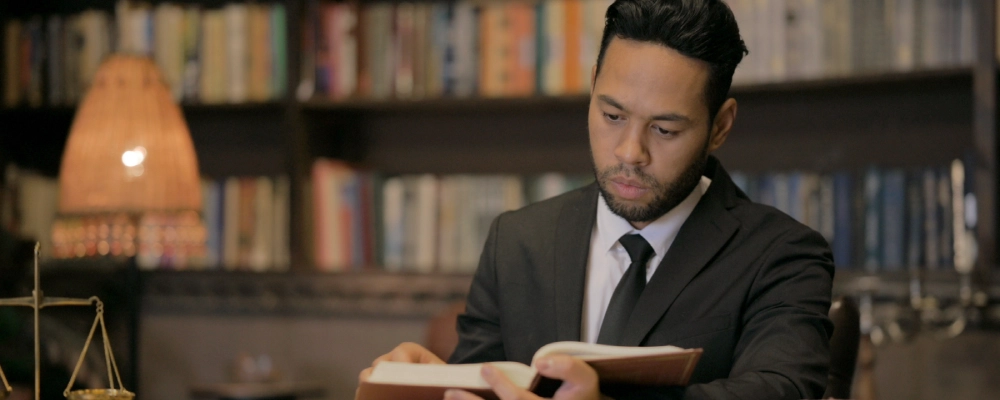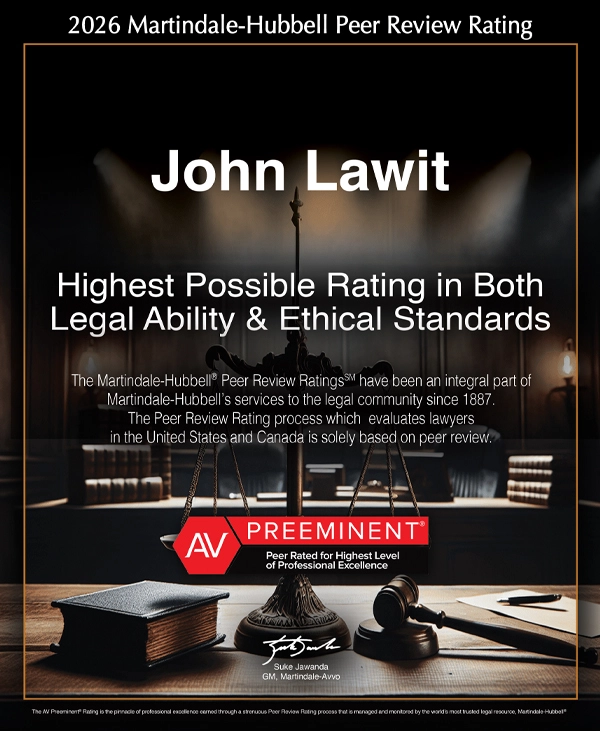Concerned about immigration issues following President Donald Trump's re-election? Click Here

Pursuing education in the United States is a dream for many international students, but navigating the student visa process can be complex, stressful, and time-consuming. At John W. Lawit, LLC, our Dallas student visa lawyers are committed to guiding students and their families through the intricacies of U.S. immigration law to help them achieve their academic goals.
From applying for an F-1 visa to transferring schools or addressing visa-related challenges, our team offers trusted legal counsel and personalized support at every stage of your journey.
We understand how important your education and future are. That’s why we offer skilled, strategic representation to help international students secure legal status, remain in compliance with immigration regulations, and overcome obstacles with confidence.
The F-1 visa is the primary student visa for international students seeking to study full-time at a SEVP-certified U.S. college, university, high school, or language training program. To qualify, students must maintain a full course load and follow all visa requirements throughout their stay.
According to the U.S. Department of State’s official student visa page, F-1 visa holders may only work under specific conditions, such as limited on-campus employment during their studies or Optional Practical Training (OPT) after completing their degree.
The M-1 visa is for students attending vocational or non-academic institutions such as trade schools or technical programs. These visas are more restrictive than F-1 visas. Students cannot change to another visa type while in the U.S., and employment opportunities are minimal.
The J-1 visa is used for exchange visitors who are part of approved programs that promote cultural exchange, such as scholars, interns, researchers, and au pairs. Some J-1 categories are subject to a two-year home residency requirement before applying for a different visa or green card.
Deciding between an F-1, M-1, or J-1 visa depends on your educational path, length of stay, and the nature of your program. Our student visa immigration lawyers in Dallas can review your goals and help ensure you’re applying for the correct visa type and meeting every eligibility requirement.
Navigating the student visa process involves several important steps. Here’s what international students need to know when applying for a U.S. student visa:
Before applying for a student visa, you must be accepted into a school certified by the Student and Exchange Visitor Program (SEVP). Once accepted, the school will issue you a Form I-20 (for F-1/M-1 visas) or DS-2019 (for J-1 visas), which is required for the visa application.
Next, you’ll need to pay the I-901 SEVIS (Student and Exchange Visitor Information System) fee. Keep the receipt, as it will be required during your visa interview.
The DS-160 is the standard non-immigrant visa application form. You’ll need to complete it online, upload a passport-style photo, and print the confirmation page for your interview.
Schedule a visa interview at the nearest U.S. embassy or consulate. Wait times vary, so it’s essential to schedule as early as possible.
Bring your DS-160 confirmation, I-20 or DS-2019, SEVIS receipt, and supporting documentation to the interview.
During the interview, a consular officer will review your documents and ask questions about your study plans, finances, and ties to your home country. A successful interview results in visa approval, but you may be subject to additional administrative processing.
If approved, your passport will be returned with the student visa inside. You may enter the U.S. up to 30 days before your program start date.
Upon arrival, you’ll need to present your visa and I-20 or DS-2019 at the port of entry.
Avoiding these mistakes helps protect your F-1 status and keeps your academic journey on track. A Dallas student visa lawyer can guide you through the process and help you stay compliant.
Applying for a student visa involves strict deadlines and precise documentation. Even minor errors can lead to delays, denials, or Requests for Evidence (RFEs).
A skilled Dallas Student Visa Attorney can help ensure your application is complete, accurate, and submitted on time.
Your application must demonstrate that you meet all eligibility criteria, including acceptance to a SEVP-approved institution and sufficient financial support. Our legal team helps you compile and organize the necessary paperwork to build a compelling case.
Students must pay the SEVIS I-901 fee and attend a visa interview at a U.S. embassy or consulate. We provide guidance on how to navigate the SEVIS process and prepare for your interview with confidence.
Many students need help transferring to a new school, extending their stay, or changing visa status (e.g., from F-1 to H-1B after graduation). We assist with these transitions to help you stay in compliance and avoid disruptions to your education.
After arriving in the U.S. on an F-1 student visa, maintaining legal status is essential to protect your academic and immigration future. Falling out of status can result in serious consequences, such as termination of your SEVIS record, loss of employment authorization, or even removal proceedings.
To remain in compliance, students must meet the following core responsibilities:
Failing to follow these requirements can disrupt your studies and immigration pathway. To better understand your responsibilities and how your data is monitored, refer to the official ICE SEVIS website.
A knowledgeable Dallas student visa lawyer can also help you stay compliant and address any issues that may arise during your stay.
Many international students wonder what happens after graduation. Fortunately, F-1 visa holders have several opportunities to remain in the U.S. and gain practical experience or transition to longer-term immigration solutions.
CPT allows F-1 students to gain practical experience related to their field of study while still enrolled in school. It must be authorized by the DSO and completed before graduation.
CPT can be full-time or part-time, depending on your program’s requirements.
OPT enables F-1 students to work in their major field for up to 12 months after graduation. It requires filing Form I-765 and receiving an Employment Authorization Document (EAD).
Students in STEM fields may be eligible for a 24-month STEM OPT extension.
F-1 students with degrees in science, technology, engineering, or mathematics (STEM) may apply for an additional 24 months of OPT, bringing their total work eligibility to 36 months. The employer must participate in E-Verify, and the training must meet DHS requirements.
After OPT, some students apply for H-1B visas for specialty occupations or pursue employer-sponsored green cards. Each option has strict eligibility rules and deadlines, making early legal guidance essential.
Choosing the right post-graduation path can be overwhelming. Our Dallas student visa lawyers can explain your options, help you meet filing deadlines, and develop a long-term immigration strategy tailored to your goals.
Visa denials can occur due to incomplete applications, insufficient ties to your home country, or doubts about your financial ability to support yourself. In some cases, past immigration violations or criminal records can also lead to denial.
If USCIS issues an RFE, it means they need more documentation or clarification before approving your visa. Our team can help you respond quickly and accurately to strengthen your case.
If your student visa is denied, you may have the option to reapply or file a motion to reopen or reconsider. We assess your situation and recommend the most appropriate course of action based on your unique circumstances.
Processing times vary, but it typically takes a few weeks after your embassy or consulate interview. You should apply as early as possible once accepted by a U.S. school.
Yes, but with restrictions. F-1 students can work on-campus part-time during the academic year and apply for OPT or CPT for off-campus opportunities.
Yes. F-1 visa holders can bring a spouse and unmarried children under 21 on F-2 visas. While F-2 dependents can’t work, children can attend school, and spouses may take non-degree courses. Be sure to include dependents in your I-20 or request an update through your DSO.
Falling out of status can jeopardize your ability to remain in or return to the U.S. You should contact an immigration attorney immediately to explore reinstatement or legal alternatives.
Many students remain in the U.S. by applying for OPT or transitioning to a different visa, such as the H-1B. An attorney can help you explore your post-graduation options.
While not legally required, having a lawyer can reduce errors, improve your chances of approval, and help you respond to any complications during the process.
At John W. Lawit, LLC, we’ve helped students from around the world navigate the U.S. immigration system. Our firm has decades of experience handling complex student visa issues, from initial applications to post-graduation transitions.
We prioritize clear communication, compassionate representation, and strategic legal guidance. Whether you’re applying for a visa or dealing with unexpected legal challenges, our goal is to protect your education and future.
Navigating the student visa process can be challenging, especially with constantly changing immigration laws and strict requirements. Whether you’re a prospective international student or a parent helping your child pursue an education in the United States, you deserve knowledgeable legal guidance.
At John W. Lawit, LLC, our experienced Dallas student visa immigration attorneys are committed to helping you understand your options, avoid common pitfalls, and submit a strong application from the start.
Call our office today at (214) 609-2242 or visit our Dallas immigration lawyer page to schedule a consultation. We’re here to support your academic journey and ensure you start your studies in the U.S. with confidence and peace of mind.
